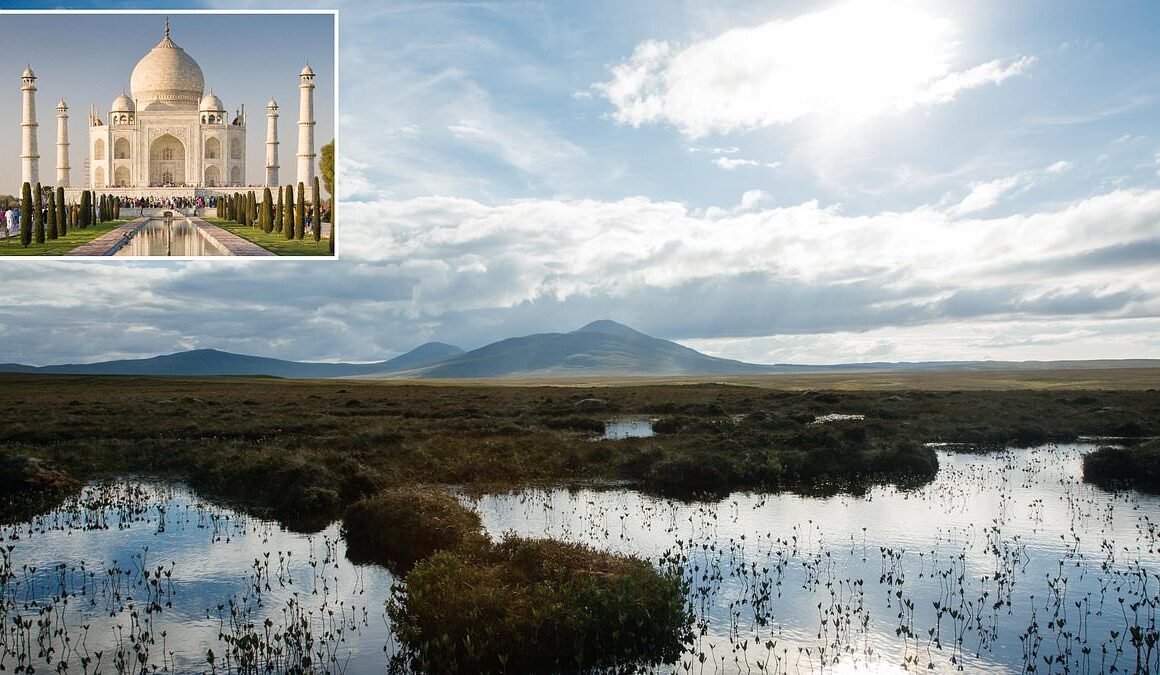It is a prestigious list of the world’s most important locations and includes the Grand Canyon as well as the Great Barrier Reef.
And now, after a 40-year campaign, a peat bog in the Highlands has become a Unesco World Heritage Site.
The Flow Country is the first peatland site anywhere in the world to be given such status in a decision hailed as a ‘momentous moment’.
Heritage chiefs recognised the importance of the area, which is widely considered to be the largest area of blanket bog in the world and covers around 1,500 square miles in Caithness and Sutherland.
Home to a diverse range of wildlife, it is the first natural world heritage site in Scotland.

The Flow Country in the Highlands has been named as a Unesco World Heritage Site
It joins the worldwide list of protected areas which includes Yellowstone National Park in the United States, Mount Etna in Italy, and Giant’s Causeway in Northern Ireland.
Golden eagles, red-throated divers and short-eared owls are among the species which call Flow Country home.
It is considered to be of outstanding importance because of the habitat it provides for such creatures and the role it plays in keeping about 400 million tonnes of carbon out of the atmosphere.
Graham Neville, of NatureScot, said it the award was a ‘momentous moment for Scotland’s people and their beloved landscape’.
He said: ‘World heritage site status will lead to greater understanding of the Flow Country and raise the profile of Scotland’s peatlands globally for their value as biodiverse habitats and important carbon sinks.’
Achieving world heritage status is a rare honour for a landscape. It is an internationally recognised designation awarded to places of outstanding cultural, historical, or scientific significance.
It means this vast tract of peat bog joins just 121 landscapes worldwide which have been awarded the designation.
The Flow Country has a unique ecosystem, which has been developing for the past 10,000 years.
From above the land resembles a mottled pattern of peat and pools, with colours shifting like an opal. But closer up there is a diverse collection of plants and rare birds.
Covering an area more than twice the size of Orkney, the vast expanse of blanket blog is a complex interlinked pool system.
Blanket bog only forms in cool places with plenty of rain, and the few plants which can grow in the Flow Country help build up the deep layers of peat.
The bogs, which are now up to 10 metres deep, have been growing since the glaciers melted away at the end of the last Ice Age.

The vast peatland now has the same status as iconic landmarks such as the Taj Mahal in India
Peat forms incredibly slowly, at a rate of just one millimetre per year.
And as it does it provides an important role in mitigating the threat of climate change because of its ability to capture and store carbon dioxide.
Because the plants do not fully decay because of the wet conditions, they are able to store the greenhouse gas whereas in other habitats such as forests it would be released.
Winning world heritage status is a rare honour, especially for a landscape of which just 121 worldwide have been given the designation.
Sir Chris Bryant, UK Government culture minister, said: ‘The Flow Country is one of our most precious resources, as a vital habitat for many species and a key site for carbon capture that continues to inform our understanding of how blanket bog can be used to help mitigate climate change.’
It is now hoped the award could help ‘support sustainable and responsible tourism’ across the region with ‘the interests of the local environment and communities at its heart’.
Jamie Stone, the Liberal Democrat MP for Caithness, Sutherland and Easter Ross, said: ‘As the MP who represents the Flow Country, I’m more than thrilled by this news.
‘Of course, many of us have long suspected that this unique habitat was probably of world importance – now we know that it most certainly is and has been recognised as such.’
Malcolm Roughead, chief executive of Visit Scotland, added: ‘Slow tourism will be a key part of that activity, whereby visitors are encouraged to take their time to fully explore the area, act responsibly, and immerse themselves in the culture and natural environment.’
The Flow Country was awarded the accolade yesterday (FRI) at the 46th session of Unesco’s World Heritage Committee.







